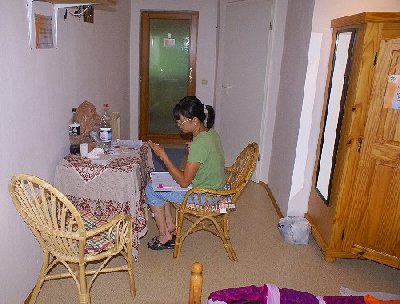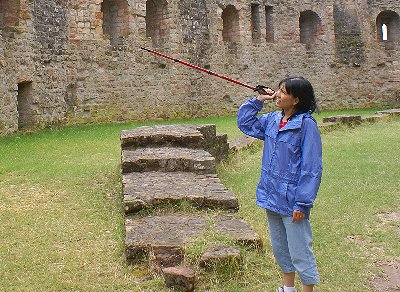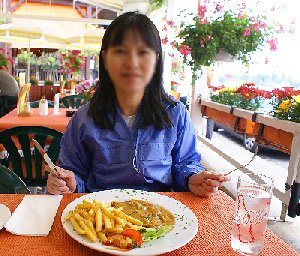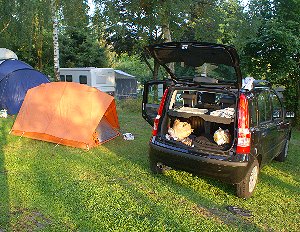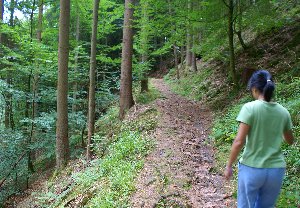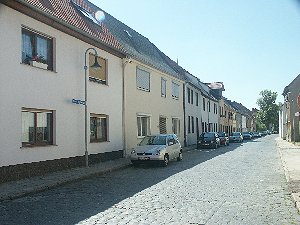Other Survival Tips....
Besides driving, there are a few other issues that should be discussed.
1. Food and dining. If you wish to eat out for every meal, expect to go broke very fast. I prefer to mix the food routine, with some dining out, but using the grocery stores a lot. This is far less expensive and allows you to find the things you specifically like. But if you choose to use the grocery stores such as Lidl, Aldi, Rewe, or Edeka, realize that these close on Sundays. So plan ahead to have supplies purchased on Saturday. Regarding tipping in restaraunts, there is a new ettiquete developing on this. Tipping used to be in the price, but apparently many in Germany (and Europe) were getting weary of poor service, and a new tipping scheme has emerged. It essentially works like this: you round off amounts, and perhaps even add an extra five or even ten percent to this. This extra tip is based on how good the service was. Moreover, you can also add an extra Euro or two for good measure. However, it must be noted that in some smaller towns these concepts have not taken hold and some can even be marginally offended if you offer an extra tip. Nevertheless, when in doubt, tip the extra. In one case, my wife and I had something to drink at Strahlenburg. The server did virtually nothing, and yet expected a tip. It was a funny, and somewhat embarrasing situation, but I didn't give her a tip since she really didn't do anything extra.
2. As to grocery stores, I have found Lidl and Rewe to be the best. The former has good variety, while the latter also carries a good selection of non-food items any traveler might find useful. Aldi tends to only carry generics and local / European products. For example, I could not find Coca-Cola products in an Aldi. Edeka stores vary, largely due to size. Larger Edekas are much like Rewes, but smaller ones in small towns can be very limited in items offered.
3. Realize that many Germans still have a "ruhetag," or "quiet day." These vary from Monday to Wednesday, but is usually the former. However, if a place is open on Saturday and Sunday, they may take both Monday and Tuesday as a ruhetag. This can be VERY frustrating. Tourist traps, such as the Rhein River, generally do not take ruhetags, but the back towns do. This even includes some castles that require an admission fee to enter. Plan accordingly.
4. Where should you stay? You have many options, from camping to lavish hotels. If you have money for the latter, then you probably aren't reading this website! But if you don't want to stay at campgrounds, the next best option is to stay at Pensions or "zimmer frei" locations. Regarding the latter, be careful. Pricey hotels in tourist traps have learned to post "zimmer frei" signs in their windows to snag the unwary. A true "zimmer frei" is a place in a small town or back road area where a local homeowner offers a spare room for a person to stay in. Pensions (pronounced "pen-zee-on") are similar to the "zimmer frei" concept, except they typically have more rooms like a small hotel. The famous German gasthaus has largely left the world of boarding due to the pensions and zimmer freis. Many pensions have communal bathrooms, but more and more now have private bathrooms. Typically, if two people choose to stay in pensions vs campgrounds, this will double their lodging costs for a trip. Note that many pension owners offer a discount if you stay three days or more, though this varies.
5. Finding a pension in a small town can be a real adventure. Don't wait until dark to do this, as you will not be able to see the signs and will search in vain! Instead, plan ahead, choose an area where you wish to base, and then seek out a good location. One way to do this is via the internet. However, the vast majority of pensions don't list themselves through internet pension groups. Therefore, one can simply drive into a small town and stop a local to ask them. This can be fun, and might produce some interesting results. For example, in one case I stopped a local guy in a small town north of Kaiserslautern and asked him if there was a pension in the area. He misunderstood me, and replied asking me what I wanted to do in his little farming town (his tone was one of disdain, like "what would you even dream of doing here?")! I repeated and clarified my request, and found a nice local place to stay for five nights. This is probably one of the best ways to find these in the small towns. Simply ask a local. However, be prepared for some funny situations as well. For example, in one town in the Pfalz I saw a sign for a pension and drove up some little back road. When I got to the place there was another sign and so I confidently rang the bell. A guy came out and when I asked him if he had a room free he looked at me bemused and said "why are you asking me this?" Turns out the pension had been closed for several years. The guy was nice enough to point me to another location so I didn't have the nerve to ask him why he still had a sign to his place out on the highway!
6. Exploring castles and other ancient sites can be fascinating, but one should dress appropriately. The tendency of Germans to wear shorts might seem cool on the surface, but is not smart. Wear long pants that are comfortable but heavy enough to resist invasive plants. Blue jeans are fine, but tend to be warmer and take long to dry when they get wet. Also, long sleeve shirts can be helpful as well, though not as critical, and a light but sufficient rain jacket is a must. Boots are great, but not necessary if your hiking is limited. However, if you intend to do some serious walking, use a good pair of hiking boots that are comfortable, especially if the weather is wet.
7. West vs. East. Eastern Germany (the old DDR) is still a mess in many ways. While it has some awesome castles to explore, it has its own unique culture that is different from Western Germany. The people generally are more crude and loud than in the western side, and they drink excessively (more than the typical German). Unemployment is very high and it shows. The infrastructure is crumbling, and they have nets beneath overpasses on the Autobahn to keep debris from falling on vehicles below. They still charge for each bathroom use, and they can be generally very rude. Be prepared to assert yourself and expect to get yelled at and cursed. If you tour smaller towns, expect to have locals staring at you with hostile looks ("what is he doing here?"). Moreover, these towns are sterile and seemingly lifeless (photo right: Lutzen). Nevertheless, I still found many very friendly eastern Germans, though their dialect was difficult for me to understand. Just be prepared for a lot of differences from the western half.
